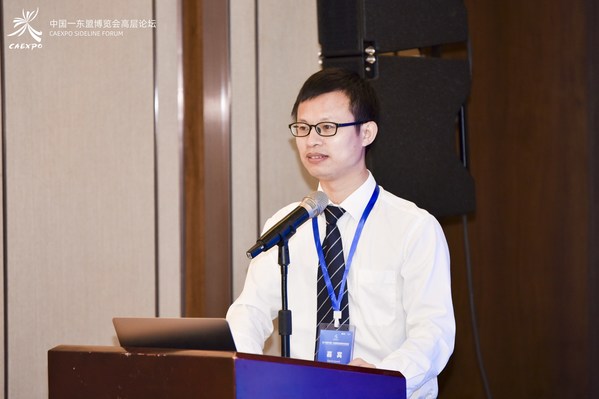GUANGZHOU, China, Nov. 10, 2022 /PRNewswire/ -- At the invitation of General Secretary of the Communist Party of China (CPC) Central Committee and President Xi Jinping, Nguyen Phu Trong, General Secretary of the Communist Party of Vietnam (CPV) Central Committee, led a high-level delegation to visit China from October 30 to November 2.
"The visit indicates that the two socialist countries seek to improve bilateral relations and further theory exchanges after the conclusion of the 20th CPC National Congress," said Lei Xiaohua, a research fellow in the Institute of Southeast Asian Studies, Guangxi Academy of Social Science, at an interview with GDToday on November 8.
Lei highlighted that the two leaders addressed major issues of bilateral relations regarding regional peace and trade balance, seeking a peaceful and pragmatic way to settle disputes and further cooperation.

Lei Xiaohua, a research fellow in the Institute of Southeast Asian Studies, Guangxi Academy of Social Science
China, Vietnam reach consensus on peaceful development
Despite impacts of geopolitical upheavals in the world, Nguyen Phu Trong reasserted at the meeting that Vietnam would not allow any country to establish a military base in Vietnam, or join any military alliance, or use force against any country, or work with one country to oppose another.
"The statement reasserted by Trong is in fact in line with the resolution proposed at the 13th CPV National Congress in 2021 which highlights independence, peace, cooperation, development as well as the adoption of diverse and multilateral foreign policies on international affairs," Lei elaborate.
He said the way Vietnam sticks to an independent foreign policy is appreciated and welcomed by China considering that the United States has made tremendous efforts to win over Vietnam for its geopolitical scheme while some countries seek to divide the world into rival ideological blocs.
As for the South China Sea issue, Lei said the attitude of both sides is obvious based on the joint statement issued on November 2 which stresses that the two sides will maintain peace and stability at sea, and will not let maritime issues affect the overall development of bilateral relations.
"The two countries have reached the consensus on properly managing the disputes and not letting them intensify and hinder bilateral cooperation. In terms of how to settle the dispute, they suggests pragmatic measures such as a Code of Conduct (COC) on the basic of consensus," said Lei.
Mutual interests highlighted for closer economic ties
In the economic domain, China and Vietnam agreed to speed up cooperation under the BRI and the "Two Corridors and One Economic Circle" plan (an initiative to boost regional economic cooperation involving southern and southwestern China and northern Vietnam).
"The two leaders stress cooperation in infrastructure construction to improve connectivity between two countries, shedding light into existing challenges such as the difference in railway construction standards. They also aim at cooperation in emerging sectors including clean energy, digital economy and cross-border e-commerce," said Lei.
Lei considers it a highlight of the meeting that the two sides addressed issues of major concern such as Vietnam's trade deficit and the distribution of interests in cooperation.
"The two sides managed to expand the 'pie' of common interests. For example, China pledged to increase the import volume of agricultural products from Vietnam and offer more customs convenience to tackle the trade deficit problem," Lei added.
Some media depicted that there is more a competitive than cooperative relationship between China and Vietnam, which Lei believes is an attempt to play the two countries off against each other out of political purpose instead of reflecting the reality.
According to China's Customs, China has long been Vietnam's biggest trade partner while Vietnam has been China's largest trade partner in ASEAN and the 6th biggest trade partner worldwide. The bilateral trade volume exceeded 200 billion USD in 2021, up 19.7 percent year on year despite the Covid-19 pandemic and global economic downturn.
"Vietnam's economy is, to a large extent, powered by export and foreign investment, which definitely leads to the large trade volume that exceeds some of the Chinese cities. More importantly, people need to look beyond the numbers so can they find China and Vietnam has been upgrading their cooperation over recent years," Lei said.
Lei elaborated Vietnam is looking to introduce Chinese technologies and investment. "Some Chinese projects such as the Long Jiang Industrial Park have achieved well-rounded development in Vietnam while the two countries have a series of cooperative projects in photovoltaic power, wind power and thermal power."
"Being an economic engine and a technological hub of China, Guangdong plays an important role in Vietnam's reform and opening-up. The potential will be huge for Guangdong to join hands with Guangxi, the region bordering Vietnam with close cooperative networks, and lead the industrial development in the region," he added.
More exchanges expected on pursuing socialist modernization
Based on the joint statement, China and Vietnam will stay committed to the socialist orientation and seeking happiness for the people and progress for mankind.
Lei believes that the CPC and CPV can deepen communication and cooperation in pursuing socialist modernization, and the Chinese path to modernization with its five major characteristics is of significant reference for Vietnam.
"For example, one of the characteristics of the Chinese path is to share its fruit of modernization among 1.4 billion Chinese people. Considering both China and Vietnam are populous countries, we can share ideas on possible measures to achieve this goal," he elaborated.
In addition, Lei considers the Chinese path to modernization will bring Vietnam enormous opportunities, saying, "It will provide Vietnam with a more vibrant market and a peaceful regional environment for future development."
 2 years ago
384
2 years ago
384 





 English (United States)
English (United States)